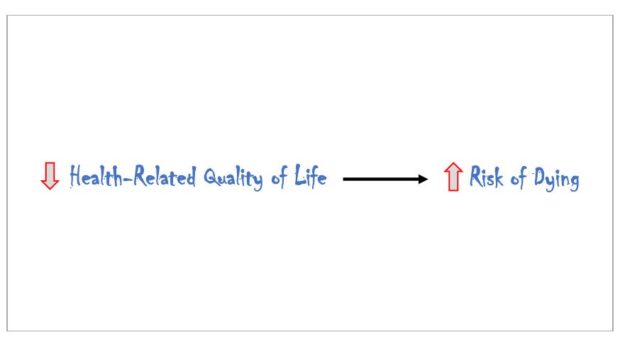
In contemporary society, quality of life (QoL) is a term used by economists, politicians, and people working across a range of other sectors and fields. It is a concept used to measure the well-being of a population and societies, with various dimensions that can include material living situation and the environment, as well as subjective perceptions of an individual’s level of contentment with their life.
To healthcare professionals, quality of life has a more specific meaning, and is sometimes referred to as Health-Related Quality of Life (HRQoL). HRQoL is an individual’s perception of how they view their general health status which includes physical wellness, emotional well-being, and social functioning. HRQoL is now frequently used in the clinical setting to monitor the quality of healthcare services given to patients, as patients are increasingly recognised as the centre of the healthcare system in today’s era.
A patient’s self-reported HRQoL has been shown to provide a good measure of their overall health status; reflecting their disease burden, mental well-being and social wellness that they experience. Indeed, there is increasing evidence that for patients with various health conditions, their self-report of HRQoL provides a good measure of their future health outcomes. What is less clear however, is whether HRQoL could also be used in the general community population, rather than just patients, to predict an individual’s future health; and thus, to help identify those individuals who are at risk of poorer health outcomes and where active interventions might be required. A systematic review is needed to provide robust evidence to address this question.
A systematic review is important because it provide a comprehensive summary that includes all of the published studies which have investigated a given research question. For this reason, it is considered less prone to bias, including all relevant data rather than selecting data which confirms an existing hypothesis. Therefore, the finding from a clearly defined and robustly conducted systematic review can provide solid evidence which can then be used for developing clinical recommendations and making evidence-based policies. This was the premise for our study.
We undertook the first systematic review to determine whether an individual’s HRQoL was a good predictor of their future risk of dying. Our review included data from 47 studies with a total of approximately 1,200,000 participants living in the community (both with and without existing health conditions). Most participants were aged 65 years and older.
The studies varied in their duration, with some being very short (9 months between when the HRQoL was measured and death was recorded), and others much longer, by following participants for up to 18 years after HRQoL was assessed.
Our study found that individuals who reported poorer HRQoL were more likely to die and in a shorter time. Interestingly, we found that poorer physical HRQoL rather than mental HRQoL was most predictive of their risk of dying during the study.
Ultimately, we suggest that doctors should incorporate a HRQoL questionnaire into an annual screening checklist for individuals attending their clinical practice. This could be used to identify individuals at higher risk for future adverse health outcomes, and who may not otherwise be detected. This practice could in turn enable initiation of active interventions for those individuals at high risk of poorer health outcomes.
Comments